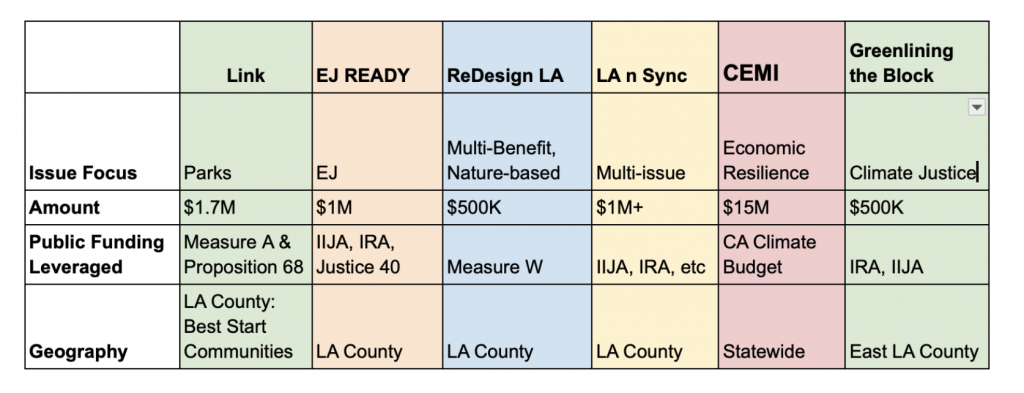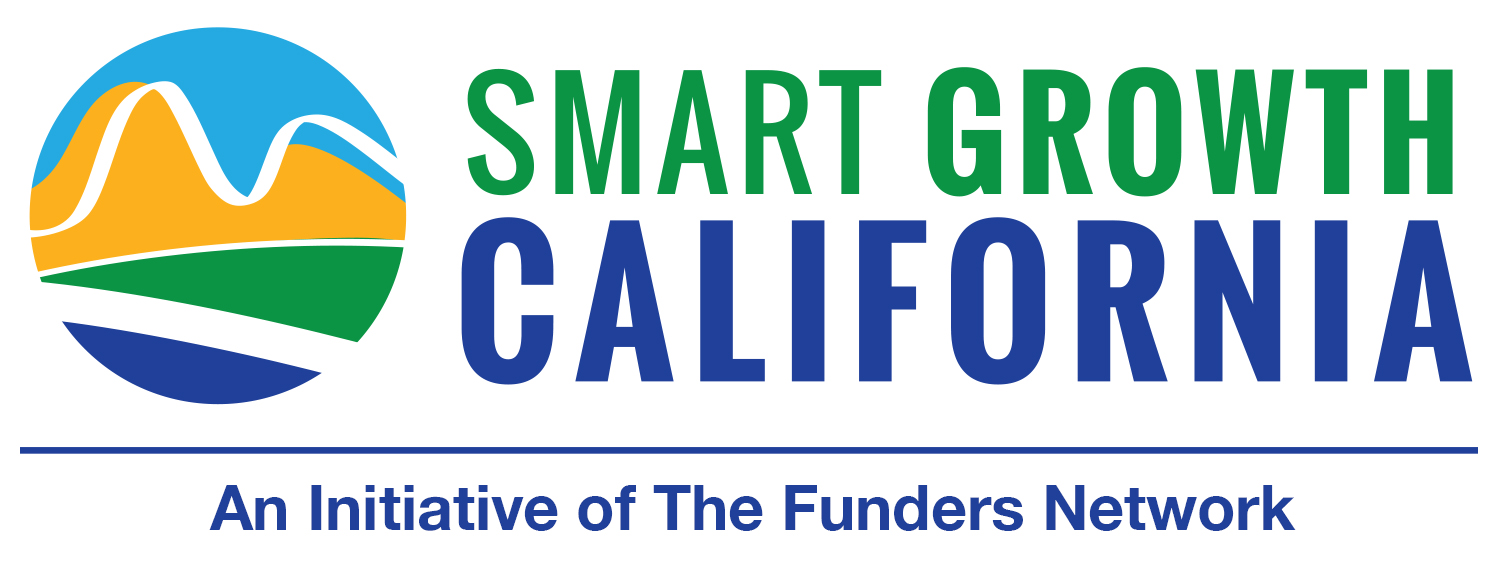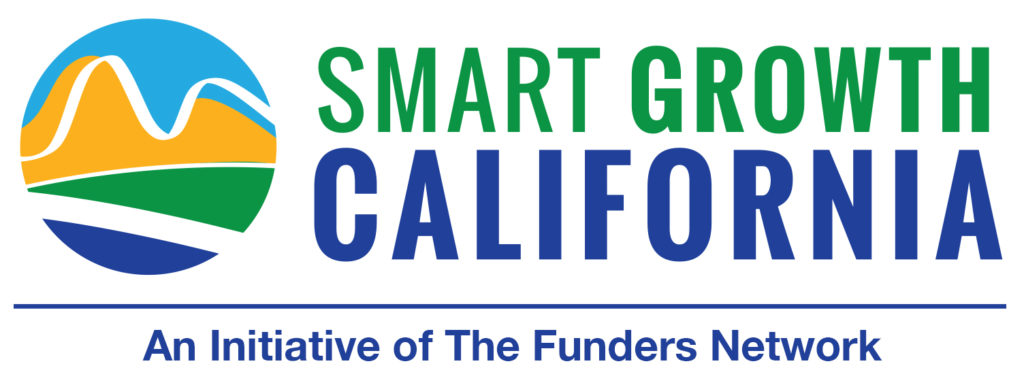Following the historic allocation of public infrastructure funding through federal programs like the Infrastructure Investment and Jobs Act (IIJA) and Justice 40, funders active within Smart Growth California’s Los Angeles Funders’ Collaborative (LAFC) swiftly engaged in efforts to ensure equitable distribution of resources to frontline communities.
Convening monthly, the Los Angeles Funders’ Collaborative serves as a platform for funders to strategize and collaborate on initiatives aimed at supporting community-based organizations striving for equitable implementation of public funds. These collective efforts have contributed to the growth of an existing power-building ecosystem across Los Angeles County.
With a steadfast commitment to racial equity, various funders within the collaborative spearheaded diverse initiatives, often in partnership with one another. Over the past two years, these initiatives have evolved significantly, attracting funding from multiple sources and extending support to a wide array of organizations.
Acknowledging the potential overlap between funders and nonprofits, the group undertook a comprehensive mapping exercise to chart the broader landscape of technical assistance and capacity-building programs in Los Angeles County. During an in-person meeting in January 2024 held outside in the courtyard of The California Endowment, participants deliberated on strategies to enhance alignment, alleviate burdens on grantees and address existing gaps in support.
Drawing from insights shared during that gathering, I developed a network map using Kumu, an online platform designed to organize complex data into relationship maps. The map captures various initiatives, who’s funding it and a summary of organizations receiving funding (note that that the map may not encompass all affiliated groups and initiatives).
Below is a summary of the current initiatives that funders within the Los Angeles Funders’ Collaborative are supporting, and their interconnections with each other. Each initiative includes a quote taken directly from websites linked below that share more information about these. In addition, each initiative also includes a graphic representation generated from Kumu listing the TA/Capacity Building Initiative, who is funding it, and what organizations have received funding from it (see legend below for details).
For additional information about each of these, click on the links below.
Link Initiative: “THE LINK Advocates, Governments, Families, and Parks initiative (Link) is working in six disadvantaged communities in Los Angeles County to establish a new model for successful collaborations between under-resourced municipal agencies, community-based organizations and technical assistance providers to build and renovate multibenefit parks.”
EJ Ready: “The only way these federal dollars will make significant climate and environmental justice gains in BIPOC communities will be if frontline organizations are equipped to draw down the federal funds and work together to promote a common agenda that centers community solutions. Recognizing this enormous opportunity and need, Liberty Hill Foundation and Resources Legacy Fund teamed up to create the EJ Ready, a program with the goal of ensuring that those closest to the pain of environmental injustice are prepared and resourced to influence and draw down historic public investments.”
ReDesign LA: “Over the past eight years, Water Foundation, ARLA, CWH and our program partners (ie. the cohort) established successful processes of providing technical assistance (TA) and building the capacity of small municipalities, tribes, school districts and local CBOs to develop and implement multi-benefit projects that integrate stormwater capture and climate resiliency.“
LA n Sync: “LA n Sync connects visionary leaders from the academic, governmental, nonprofit, business and philanthropic sectors to leverage the talent and resources of Los Angeles County to support L.A. organizations applying for funding, spur innovation and attract federal and state dollars to address the critical needs of the region.”
California Economic Mobilization Initiative (CEMI): This is an inclusive and equitable effort to build knowledge and capacity with California nonprofits and tribal partners, equipping them to participate in these funding opportunities, which they have been historically excluded from. In response to the California Jobs First/Community Economic Resilience Fund, The LA High Road Transition Collaborative is dedicated to fostering diverse local economies and establishing sustainable industries that generate high-quality employment opportunities accessible to all Californians.
Greenlining the Block: “Greenlining the Block is an initiative developed by The Greenlining Institute to support the leadership and expertise of communities of color to prepare for and maximize federal, state and local infrastructure investments to drive effective climate action that meets community needs.”
Infrastructure Justice for LA Coalition: “Our Coalition supports infrastructure projects that integrate the planning for and implementation of projects that provide benefits related to water, housing, parks and transit. We advance policies that will facilitate the development of projects that provide multiple benefits and apply taxpayer funds in the most efficient, effective way possible and prioritize delivering benefits to frontline communities.”
Greening American Cities Initiative: “On July 17, 2023, the Bezos Earth Fund (the Earth Fund) launched Greening America’s Cities (GAC), a new, multi-year, $400M initiative to invest primarily in community environmental justice organizations through 2030. In 2023, $50M was granted to 24 urban greening organizations and 6 national Partners providing technical expertise and support for greening projects in and around five cities across the US, including Los Angeles.”
All of these initiatives contribute to a larger power building ecosystem:
Power Building Ecosystem Model: “Achieving health and justice for all Californians is beyond the reach of any single organization, strategy or approach. In fact, it requires an ecosystem of diverse organizations that can collectively influence the broad terrain where ideas, policies and power are contested. Central to the ecosystem are organizations developing an active and aligned base of leaders and members (whether community, students, faith or labor) that can engage decision makers and hold them accountable.
Below is additional information about these Initiatives:
 If you are aware of other technical assistance and/or capacity building programs in Los Angeles County, or you would like to learn more about the Los Angeles Funders’ Collaborative and/or get a link to the Kumu network, please contact Ron Milam.
If you are aware of other technical assistance and/or capacity building programs in Los Angeles County, or you would like to learn more about the Los Angeles Funders’ Collaborative and/or get a link to the Kumu network, please contact Ron Milam.
July, 2024 Update: Since this blog was originally posted, we’ve begun adding a new element to the network map: specific projects that have received public funding (noted in red in the maps below). Philanthropic support through these various initiatives mapped out this this posthas leveraged millions of dollars in public funding in support of community-centered projects.




